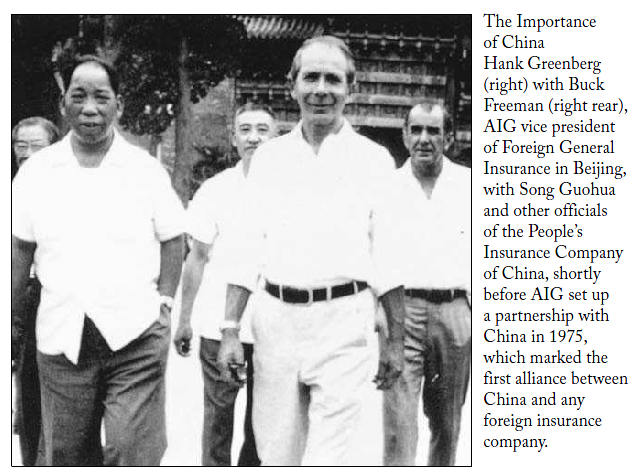
... In recent months, he has criticized Greenberg for being greedy, rough and Jewish; Manton for being stupid; Ahlers for being narrow, bad with people and endangering the UBank in illiquid Latin American investments; Tweedy for being weak and run by Mrs. Tweedy; Roberts as being inadequate to run AIUO worldwide, hence he should share it with Buck Freeman; Freeman for not knowing the business; Stempel for being merely a caretaker and one who could not run and should not run AIRCO; even K.K. he says is no good in recruiting and training people or building replacements. . . .
http://publicintelligence.net/maurice-r-greenberg/
Overseeing AIG’s Illicit Business Practices
During his tenure as CEO of AIG, Mr. Greenberg greatly expanded the company’s offshore reach, by overseeing the creation of hundreds of shell companies in offshore jurisdcitions.
One of the heated criticisms people have made about AIG for many years, and especially since the company confronted its accounting and related crises, is that it is too complicated.When Starr was alive there were fewer than 100 companies, many offshore. By the time Greenberg resigned, there were hundreds of companies, again many offshore. Some would argue it is not only complex, but impenetrable to an outsider, and especially to insurance regulators. That has its advantages. Good for dealing with regulators, bad for investors, especially in this age of transparency. Yet to someone familiar with the corporation, the maze really is not so complicated, and Starr clearly was not trying to make it more complicated, especially since the regulatory issues of the 1940s were not what they are today. The overriding issue is that because so many of the companies are incorporated and domiciled offshore, it makes regulators suspicious, and it is true that the elaborate corporate organization chart could provide the means for chicanery.

An Overview of the Global Debt Crisis Speaker: Alan Greenspan ... Presider: Sebastian Mallaby ~
Alan Greenspan discusses the increase in U.S. debt levels, the roles of the Central Bank and the European Bailout Fund, and Germany's position in the European financial crisis ....
....This symposium is presented by the Maurice R. Greenberg Center for Geoeconomic Studies and is made possible through the generous support of Stephen C. Freidheim.

Book Review: Greenspan's Fraud, by Ravi Batra
"... Here is a book by an outstanding professor of economics, who predicted the date of the crash of the end-of-’90s economic bubble. Ravi Batra deflates Greenspan’s reputation as an economic wizard by presenting in great detail how Greenspan undermined the global economy. Batra calls Greenspan a fraud because Greenspan flip-flopped often in order to stay in the good graces of powerful people. Although supposedly a conservative, the main principle he followed was to always please the rich and powerful.
Greenspan, as head of the Federal Reserve, was supposed to maintain an economy that supports us all. But Batra says this about Greenspan's approach:
"Greenspan's economics may be abbreviated to Greenomics, which essentially turns out to be Greedomics, signifying a view that nothing should be done to interfere with business greed and the pursuit of profits."Greenspan believes in rugged individualism and laissez faire. He and Ayn Rand were of the same mind about the virtue of selfishness. I had read some time ago that Ayn Rand said that Big Business is America's "persecuted minority." From Batra I learned that she got that idea from Greenspan.
Greenspan is against regulation of business. He is even against anti-trust laws. He feels the government should not be helping anyone in programs such as Social Security. Most important to him, taxes should be a low as possible.
Greenspan had a big hand in the Social Security brouhaha.
Back in 1981 Reagan appointed Greenspan head of a Social Security Commission that was supposed to fix the system.
How did he fix it?
By recommending the most regressive tax we have ever had in U.S.: the payroll tax, which applies only to workers at the bottom and the middle class. His recommendations became law in 1983.
He tried later to reduce worker benefit increases without success.
In 2001 he was in favor of Bush's tax cuts and recently for Social Security privatization, even though they both would increase the deficit.
He says he is for low taxes. But he recommends tax cuts to take care of the rich and a payroll tax to take care of the poor.
After being for tax cuts for the rich he asked Congress to follow their pay-go approach when legislating for the poor. Then he had the gall to complain about the huge deficit when he had previously recommended the huge tax cuts.
What a flip-flopper! His flip-flops on Social Security and taxes are insignificant compared to what he did with regards to regulation.
Greenspan is for DE-REGULATION of business. Everybody knows this. Rich people swoon at his feet because of this. However, Batra tells the story of how when BIG PLAYERS are involved, REGULATION is needed.
In 1997 there was a crash. All sorts of people and businesses were in trouble. Greenspan believes that the market is holy: it will make corrections and the government should not interfere. However, there was an outfit called Long Term Capital Management (LTCM), a highly risky hedge fund for super-wealthy investors. It had "only" $3.5 billion, but borrowed $100 billion to invest. The borrowed money and the $3.5 billion equity disappeared.
What do you think Greenspan did? He bailed out LTCM. Yes, we must have de-regulation. However, we cannot allow such a big, rich, influential company to die.
Batra describes many Greenspan flip-flops. Toward the end of the book, Batra recommends a few reforms, among which are:
- Cut payroll tax
- Raise corporated income tax and eliminate loopholes
- Top tax bracket - 40%
- No preferential treatment for dividends and capital gains
- Raise minimum wage to $8 per hour
- Enforce anti-trust laws and break up conglomerates
- Free trade
- More manufacturing
- Economic democracy
No comments:
Post a Comment